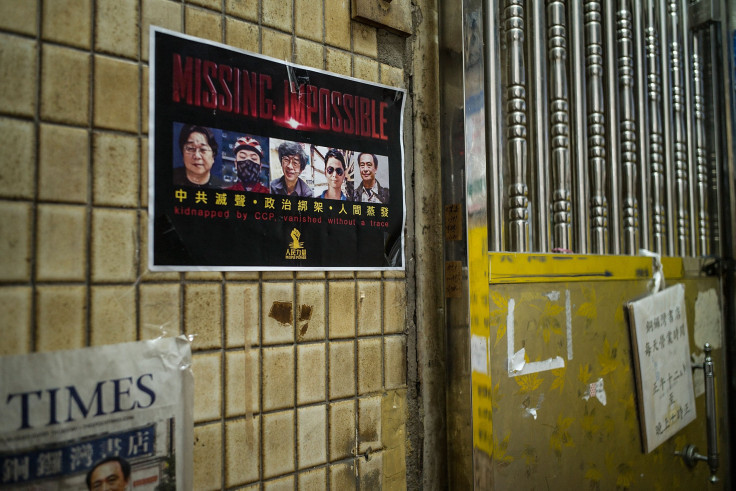Press Freedom In Hong Kong Declining, Say Journalists And Public After Mysterious Disappearance Of Local Publishers

HONG KONG — Both Hong Kong journalists and ordinary citizens feel that press freedom in the former British colony is declining, with the public’s perception falling even faster than that of media workers for the first time ever, a new survey has found. Experts said it was a sign of growing concern at the impact of China’s control on the city, following the unexplained disappearances of several publishers critical of China’s leadership, who later resurfaced in mainland China, and the takeover of several local media organizations by Chinese investors.
The annual survey, commissioned by the Hong Kong Journalists' Association, showed a “very severe” deterioration in press freedom, according to HKJA chairwoman Sham Yee-lan. Eighty-five percent of journalists and 54 percent of members of the public felt press freedom had decreased over the past year — and while the public's ranking for press freedom, 47.7 out of 100, was still higher than the 38.2 given by journalists, it fell faster, by 1.4 points compared to 0.7.
“The more significant drop in rating by the general public hints that the damage caused to press freedom is so obvious that even the general public is aware of the problem,” Sham said in a statement.
The survey of some 450 journalists and just over 1,000 ordinary citizens was carried out in January and February, soon after Hong Kong publisher and bookseller Lee Bo, who had published many books critical of China’s leaders, mysteriously disappeared from a Hong Kong street. Lee, a British citizen, later reappeared in China, without any record of having passed through Hong Kong immigration — and subsequently said in a letter that he had gone to the mainland voluntarily to help Chinese police with an investigation. But with four of his colleagues also apparently detained in the mainland, skepticism remains high in Hong Kong, which reverted to Chinese rule in 1997 but under the terms of the handover agreement between Britain and China, was supposed to keep its separate social and legal system for 50 years.
“The Lee Bo incident has had a chilling effect on the general public — that someone could just disappear like that,” Professor Lisa Leung of Hong Kong’s Lingnan University, a consultant on the HKJA survey, told International Business Times. “Coupled with recent cases of Beijing officials talking directly to the Hong Kong people rather than going through the Hong Kong government, people have a sense of increasingly direct control from China. This survey shows their accumulated perceptions are coming home to roost.”
There have been a string of incidents that have created concern about press freedom in recent years — including a violent attack on Kevin Lau, a former editor at Ming Pao, one of Hong Kong’s most respected newspapers, and an investigation into outspoken Apple Daily newspaper founder Jimmy Lai by the city’s anti-corruption body, which Lai's supporters say was politically motivated. But public perceptions have worsened since 2014, when Chinese officials declared the city’s Occupy Central pro-democracy protests an illegal movement. And the detention of two Apple Daily reporters by police last December, after they followed the city’s education minister to public events to see how assiduously he was carrying out his duties, has led to further concerns.
The HKJA’s survey also found that perceptions of self-censorship were worsening, with journalists surveyed giving Hong Kong a score of just 2.9 out of 10 on the issue, and the general public giving its performance only 4.2 out of 10. The report suggested that media had "the greatest worries about criticizing the [Chinese] central government in Beijing."
Leung also told IBT that turnover of journalists was now quite high in Hong Kong's media. And the survey found that the takeover of Hong Kong’s long-established leading English-language newspaper, the South China Morning Post, by Chinese e-commerce and internet giant Alibaba late last year had worried citizens, with 88 percent of journalists and 57 percent of members of the public surveyed saying this had damaged press freedom.
Alibaba, which says it wants to help the newspaper make better use of online platforms, has made some efforts to reassure Hong Kong public opinion — though comments by its executive vice chairman Joe Tsai did not reassure everyone, after he took aim at western coverage of China. Tsai said some Western reporters “may not agree with the system of governance in China and that taints their view of coverage… When it comes to covering China, a country of such size and importance, the world needs more than a single narrative.”
Hong Kong’s media remain more critical and challenging of authorities than those in mainland China — and the public perception of the media’s competence as a watchdog remained unchanged, at 6.3 out of 10, the HKJA said. However, U.S.-based monitoring group Freedom House ranked the city just 83 out of 199 countries for press freedom in a recent report, while international journalist organization Reporters Without Borders placed it 70th in its global press freedom index last year, compared to a ranking of 61 in 2014 — and 18 in 2002.
HKJA’s Sham also repeated calls for Hong Kong to introduce a freedom of information act as soon as possible, saying the city's government was failing to release information in a timely manner.
“Without sufficient protection by law, journalists are fighting an uphill battle,” she said.
© Copyright IBTimes 2024. All rights reserved.






















